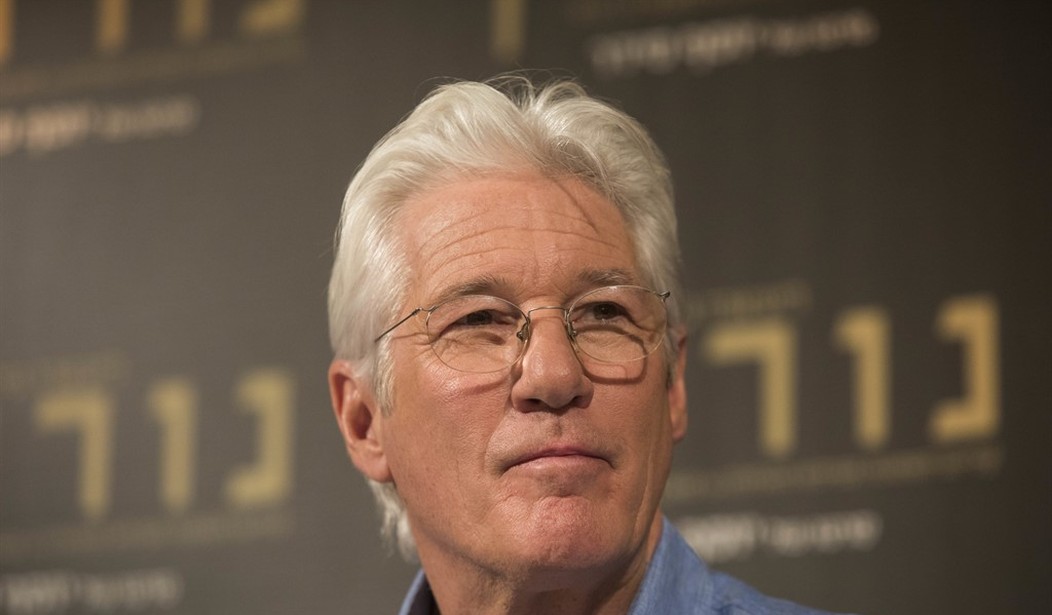Hollywood has more than dabbled with politics for decades, at awards shows and in every other aspect of the film industry. Vanessa Redgrave’s Oscar speech attacking “Zionist hoodlums” and Paddy Chayefsky’s angry rebuttal in 1978 (which I watched live at the time) might have been an anomaly in those days, but the Academy Awards and other self-congratulatory platforms have become defined by partisan politics and posturing over the last couple of decades. Most recently, Meryl Streep’s anti-Donald Trump Golden Globes speech has been hailed by others within the entertainment industry as a courageous demonstration of speaking truth to power — even though it preceded Trump’s actual presidency by almost two weeks.
Not all powers are spoken to equally within the celebrity clique, however. The Hollywood Reporter’s Tatiana Siegel notes the curious case of Richard Gere, one of the most durable of leading men in the industry, who has gotten a cold shoulder from the studios over the last decade. Siegel, Gere, and even Susan Sarandon chalk it up to Gere’s outspoken opposition to the communist rule in China and their oppression of Tibet. Gere has shifted to indie films out of necessity, because when it comes to speaking truth to power, Hollywood prefers to target powers that make them feel better rather than those who can cost them money:
But now that Hollywood is cozying up ever closer to the authoritarian superpower, and studios are careful not to offend the government that oversees what has become the world’s second-biggest box-office market, the star also is paying a price. “There are definitely movies that I can’t be in because the Chinese will say, ‘Not with him,’ ” he acknowledges matter-of-factly. “I recently had an episode where someone said they could not finance a film with me because it would upset the Chinese.”
Despite the fact that Gere, now 67, was once one of the most sought-after leading men of his generation, he hasn’t made a full-fledged studio movie in nearly a decade — not since 2008’s Warner Bros./Village Roadshow romance Nights in Rodanthe. The film industry might pride itself on promoting free speech (this year’s awards season offered a number of anti-Trump speeches that far eclipsed Gere’s ’93 criticism of the Chinese), but China remains Hollywood’s third rail. At a time when there’s no shortage of actors in their 60s — including Tom Hanks, Denzel Washington, Liam Neeson, Sylvester Stallone and even Mel Gibson — being courted for studio films, Gere must stick to indie fare. He currently has two small features coming out within the span of three weeks: He plays the titular antihero in Sony Pictures Classics’ Norman (which opened April 14) and a congressman bracing for scandal in The Orchard’s The Dinner (May 5). But with Gere earning some of the best reviews of his career in recent years, particularly with Norman (The New York Times gushed that he “has never been better,” while Rolling Stone says he “tones down his star charisma and hits a new career peak as a Jewish fixer on the ropes”), it’s clear that the actor’s exclusion is to Hollywood’s detriment.
Gere’s not struggling for cash, as Siegel notes. He has apparently taken enough care with his finances to put his personal wealth in the nine-figure category, although an upcoming divorce will put a dent into that. Gere insists that he enjoys working outside the studio system, but that he doesn’t have any options otherwise anyway. Gere recalls his ban from the Academy Awards after his 1993 protest of China’s occupation of Tibet as more of a lark, but Sarandon — who’s hardly a political wallflower or a conservative — calls out the studios for their hypocrisy:
By comparison, that old Academy ban seemed trivial. “I didn’t have to put on a tuxedo again. I was fine with that,” he shrugs. But Sarandon, who has starred opposite Gere in Arbitrage and Shall We Dance and was once his neighbor in New York, says there is a double standard at play. “It doesn’t matter if you’re outspoken about Trump, because Hollywood hates Trump,” she says. “But it was brave of Richard to say what he said. He was drawing attention to the things that everyone has agreed not to pay attention to. That’s the sin.”
Well, Trump did make some crass comments about women, and has policies which these celebrities genuinely oppose. What could China have done that stacks up against that? Christian Toto has a list, actually:
Hollywood hearts China, warts and all. What warts, you say?
- Curbing religious freedom
- Clamping down on free speech
- Imprisoning dissidents
- Micro-managing family planning
And yet you rarely, if ever, hear celebrities critique the Chinese government or specific policies. The industry craves the money Chinese audiences can bring to a project. The nation is the second leading movie market … and rising.
Christian’s being a little too kind on the last bullet point. China had a forced-abortion policy for many years, which goes a little beyond micro-managing family planning. Did we ever hear a peep from celebrities at their awards shows about that widespread practice? [taps microphone] Is this thing on?
Money talks, baby. Money talks. And when money talks, Hollywood and the celebrity clique stops doing so.








Join the conversation as a VIP Member